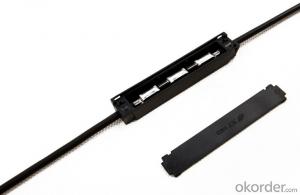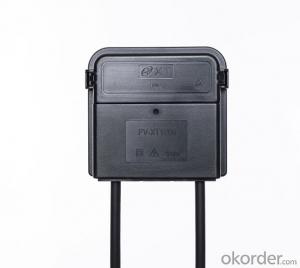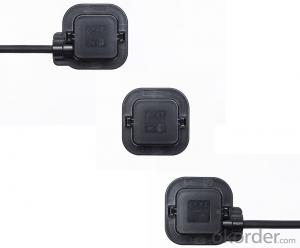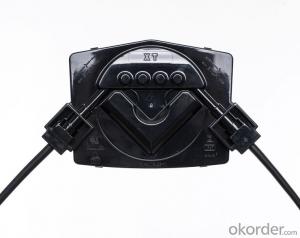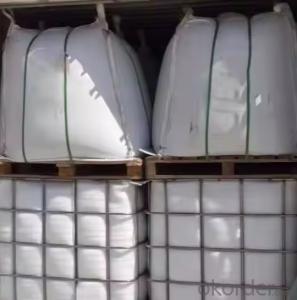PV Juction Box >> XT04 TUV、UL 、 ISO9001 Certification
- Loading Port:
- Guangzhou
- Payment Terms:
- TT OR LC
- Min Order Qty:
- 3000 pc
- Supply Capability:
- 3000000 pc/month
OKorder Service Pledge
OKorder Financial Service
You Might Also Like
Feature
a. leading Technology
b.long usable
c. securable and reliable Structure
d. simple Operation and easy Installation
e. low contact Resistance
f.good electric Protection
Product description
1. All the connection made by double fixed connection low power loss
2. With the capacity of anti-aging and resistance to ultraviolet radiation on the outer cover with excellent box design with good thermal dissipation
3. Demonstrating safe, realiable and excellent lasting functionality, applicable in harsh outdoors working ambient
4. Big variety for choices,1 rail ,2 rail,3 rail,4 rail,5 rail,6 rail.mini junction box and solar junction box for solar street light
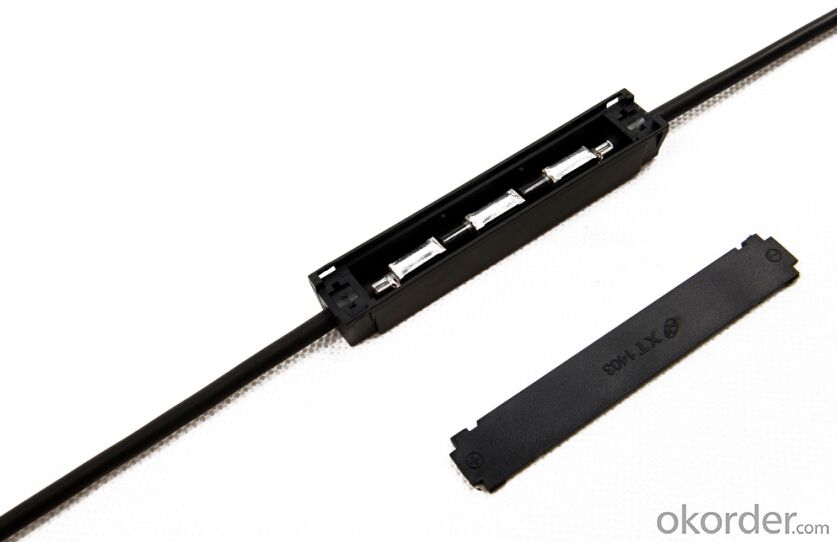
Item | Data |
Terminals for Ribbons | 3/4 |
Rated Current | 7A |
Rated Voltage | 1000V |
Dimension | 119*81.3*21.6mm |
Temperature | -40℃~+85℃ |
Size of Cables | 4 mm2/12AWG |
Size of Ribbons | W(6±2mm)*T(0.3±0.15mm) |
Protection Degree | IP65 |
Flammability Class | V-0 |
FAQ
1. How long will my inquiry get response?
Your inquiry related to our products or prices will be replied within 24 hours.
2. Can I get professional service and suggestion?
Well-trained and experienced staffs to answer all your questions in fluent English.
3. Do you accept OEM or customized design?
OEM & ODM, any your customized lightings we can help you to design and put into product.
4. What if I need specific design?
Distributorship are offered for your unique design and some our current models.
- Q:Can a solar energy system be installed on a building with a thatched roof?
- Installing a solar energy system on a thatched roof is indeed possible. However, there are several factors that must be considered. Thatched roofs are constructed from dry vegetation and require special precautions to prevent the risk of fire. Therefore, it is important to seek advice from a professional solar installer who has experience working with thatched roofs. The solar panels can be mounted on the roof, but special care must be taken to avoid damaging the thatch during installation. The installer will need to locate suitable attachment points that do not compromise the integrity of the thatch. Strengthening the roof structure may also be necessary to support the weight of the panels, as thatched roofs are generally more fragile compared to conventional roofs. Moreover, the positioning of the solar panels is crucial. Thatched roofs often have a pitch or slope, and the panels should be installed at an angle that maximizes exposure to sunlight. The installer will need to assess the roof's orientation and shading to determine the most optimal placement for the panels. Regular maintenance is essential for both the solar panels and the thatched roof. The thatch should be inspected periodically for any signs of wear and tear, and any damaged areas should be promptly repaired to prevent leaks. Similarly, the solar panels need to be cleaned regularly to ensure optimal performance. The installer can provide guidance on maintenance schedules and procedures. In conclusion, while it is possible to install a solar energy system on a building with a thatched roof, it requires careful planning and expertise. Consulting a professional solar installer who understands the intricacies of thatched roofs is crucial to ensure a safe and efficient installation.
- Q:Can solar energy systems be used in historical or protected buildings?
- Yes, solar energy systems can be used in historical or protected buildings. In fact, incorporating solar energy systems into such buildings can be a smart and sustainable solution. While the installation of solar panels on historical or protected buildings might require careful planning and consideration, it is certainly possible to preserve the integrity and aesthetics of the architecture while benefiting from renewable energy sources. One approach to installing solar energy systems on historical or protected buildings is by using integrated solar panels. These panels are designed to blend seamlessly with the building's design and are installed in a way that does not alter the historical features. This can be achieved by placing the solar panels on flat roofs, using solar tiles, or installing solar panels on less visible parts of the building, such as the rear or sides. Another consideration when installing solar energy systems on historical or protected buildings is the preservation of the building's structural integrity. This can be done by employing non-penetrating mounting systems that do not require drilling or damaging the building's structure. Additionally, consultation with architects, engineers, and preservation experts is crucial to ensure the installation process adheres to any preservation guidelines or regulations. By embracing solar energy systems, historical or protected buildings can become more sustainable and reduce their carbon footprint. Solar panels can provide a clean and renewable source of electricity, reducing dependence on fossil fuels and decreasing greenhouse gas emissions. Moreover, solar energy systems can often generate enough power to meet the energy needs of these buildings, making them self-sufficient and potentially even providing surplus energy that can be fed back into the grid. In conclusion, solar energy systems can indeed be used in historical or protected buildings with careful planning and consideration. By utilizing integrated solar panels and consulting with preservation experts, it is possible to harness the benefits of renewable energy while preserving the architectural and historical value of these buildings. This approach not only ensures a sustainable future but also showcases the harmonious coexistence of modern technology and historical preservation.
- Q:Are there any tax benefits for installing a solar energy system?
- Yes, there are tax benefits available for installing a solar energy system. The federal government offers a Solar Investment Tax Credit (ITC), allowing homeowners and businesses to deduct a percentage of the system's cost from their taxes. Additionally, some states provide additional incentives such as tax credits, exemptions, or grants to promote the adoption of solar energy. It is advisable to consult a tax professional or visit the government's official websites for the most accurate and up-to-date information on available tax benefits.
- Q:Are there any risks of electrical grounding issues with solar energy systems?
- Yes, there can be risks of electrical grounding issues with solar energy systems. Improper grounding or lack of proper grounding can lead to electrical shocks, system malfunctions, and even fire hazards. It is crucial to ensure that solar panels, inverters, and other electrical components are correctly grounded to minimize these risks and ensure the safe and efficient operation of the system.
- Q:I usually have to use about 10 degrees, more in the summer! Winter sunshine time 10 hours! Who knows how much a set price, what brand?
- Sold to the power supply bureau 0.45 yuan once, the state subsidy fee of $0.42, a year issued 3000 kwh.
- Q:What is the lifespan of solar cells used in solar energy systems?
- The lifespan of solar cells used in solar energy systems can vary, but on average, they are designed to last for approximately 25 to 30 years.
- Q:Can solar energy systems be used for powering greenhouses?
- Yes, solar energy systems can be used for powering greenhouses. Solar panels can generate electricity that can be used to power lighting, ventilation, heating, and cooling systems in greenhouses. This allows for a sustainable and renewable source of energy, reducing reliance on fossil fuels and minimizing greenhouse gas emissions. Additionally, solar energy systems can be integrated with energy storage solutions to ensure continuous power supply even during periods of low sunlight.
- Q:What is the efficiency of solar energy systems?
- The efficiency of solar energy systems refers to the amount of sunlight that is converted into usable energy. It is typically measured as a percentage of the total sunlight that strikes the surface of the solar panels and is converted into electricity. The efficiency of solar energy systems can vary depending on various factors such as the type of solar panel technology used, the quality of the panels, the location and orientation of the panels, and environmental conditions. On average, the efficiency of solar panels available in the market today ranges from around 15% to 20%. However, there are more advanced solar panel technologies, such as monocrystalline and polycrystalline panels, that can achieve higher efficiencies, up to 25%. It is worth noting that the efficiency of solar panels is constantly improving due to advancements in technology and research. Scientists and engineers are continuously working to develop more efficient solar cells and panel designs to harness more energy from the sun. Furthermore, it is important to consider that the efficiency of solar energy systems is not the only factor to consider when evaluating their overall performance. Other factors like the cost of installation, maintenance requirements, and the availability of sunlight in a particular area are also important considerations when determining the effectiveness and suitability of solar energy systems.
- Q:Can solar energy systems be used in powering music studios or recording studios?
- Yes, solar energy systems can be used to power music studios or recording studios. Solar panels can generate electricity to meet the power demands of these facilities, providing a clean and sustainable energy source. This can help reduce electricity costs and carbon footprint while ensuring a consistent power supply for the studio's equipment and operations.
- Q:Do solar energy systems require a backup generator?
- No, solar energy systems do not require a backup generator. They can store excess energy in batteries for use during periods of low sunlight or at night.
1. Manufacturer Overview |
|
|---|---|
| Location | |
| Year Established | |
| Annual Output Value | |
| Main Markets | |
| Company Certifications | |
2. Manufacturer Certificates |
|
|---|---|
| a) Certification Name | |
| Range | |
| Reference | |
| Validity Period | |
3. Manufacturer Capability |
|
|---|---|
| a)Trade Capacity | |
| Nearest Port | |
| Export Percentage | |
| No.of Employees in Trade Department | |
| Language Spoken: | |
| b)Factory Information | |
| Factory Size: | |
| No. of Production Lines | |
| Contract Manufacturing | |
| Product Price Range | |
Send your message to us
PV Juction Box >> XT04 TUV、UL 、 ISO9001 Certification
- Loading Port:
- Guangzhou
- Payment Terms:
- TT OR LC
- Min Order Qty:
- 3000 pc
- Supply Capability:
- 3000000 pc/month
OKorder Service Pledge
OKorder Financial Service
Similar products
New products
Hot products
Related keywords
